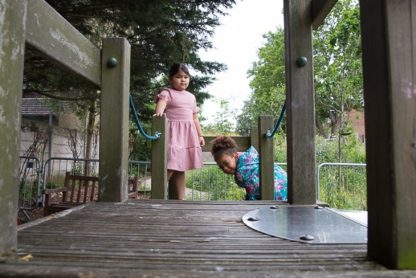A research project looking at the significance and relevance of play in the daily lives of low-income families.
This project aimed to work with low-income families (with annual income of less than £10,000) from diverse ethnic backgrounds in early years settings run by HomeStart (a UK charity). The research project explored the potential of a Froebelian approach to support and engage families in ways that matter to them.
Focusing on play, the project aimed to:
- understand the significance and relevance of play in the daily lives of low-income families
- understand the key challenges facing these families and examine the way play opportunities can be improved for them
- build on and develop Froebelian ideas to consider how they could become more relevant and meaningful
- inform policy by mobilising more inclusive iterations of Froebelian pedagogies as an instrument for multidimensional social justice.
"Research is needed to understand the challenges facing low-income families from diverse backgrounds in engaging their children with play opportunities. In doing so, this project bridged Froebelian philosophy and contemporary social science scholarship on low-income families in early years setting... developing Froebelian ideas in new, productive directions and interrogating their potential to address inequalities in early year contexts through policy change."
Dr Kate Hoskins, project lead

The study included four contrasting case studies locations in the Midlands (two cases) and the South East (two cases) of England, containing a mix of urban, suburban and rural areas.
The research team worked in partnership with HomeStart, a national charity that works with low-income families with young children aged from birth to six. The project took a three-phase qualitative, family centred approach to examine how parents with children attending HomeStart centres understand and enact play at home and any opportunities and/or challenges they perceive or experience in relation to Froebelian principles. The research process included:
- parent/carer focus groups
- in situ play reflections
- family interviews.
This project connects to three Froebelian principles:
- the value of childhood in its own right
- relationships matter
- the central importance of play.
"At the heart of this project is a commitment to policy change to further support low-income families by providing tools, strategies and material resources to enhance the spaces and opportunities to engage with childhood in its own right."
Dr Kate Hoskins, project lead
About the research team
Dr Kate Hoskins is a Reader in Education at Brunel University. Her research focuses on education policy, identity, inequalities in relation to early years, further and higher education. Her recently funded project with Professor Alice Bradbury examined the role of nursery schools in reducing the impact of socio- economic disadvantage in the early years sector. Kate is a Trustee, Chair of Research Sub-Committee and Co-Chair of Education & Research Committee at the Froebel Trust.
Dr Emma Wainwright is a Reader in Education and Human Geography. Her research focuses on education, training and welfare among low income and marginalised groups, with particular focus on families and parenting.
Dr Utsa Mukherjee is a Lecturer in Education at Brunel University London. His research interests lie in the study of children’s play and leisure, with key focus on the way social inequalities are reproduced within these spaces.
Dr Yuwei Xu is an Assistant Professor at the University of Nottingham. His research focuses on social justice and inclusion in early years education, having published work on challenging gender heternormativity in the sector.
Other Froebel Trust funded research
Enacting Froebelian principles in practice - Dr Kate Hoskins and Dr Sue Smedley, 2018

